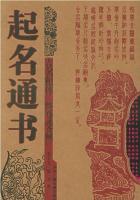If we look to the common people in the first quarter of the century, we find them in a state of great rudeness in respect of the comforts and elegancies of life.In the Highlands, they are scarcely removed above the lowest state of barbarism; and in the borders between the Highlands and Lowlands, the Celts are lifting cattle and exacting black-mail from the Lowlanders.Even in the more favored districts in the south of Scotland, the ground is unfenced; roads are very rare; and goods are carried on the backs of horses.The clothing of the people in the same region is of undyed black and white plaiding, and neither men nor women have shoes or stockings.Their ordinary food is oatmeal, pease, or beer, with kail groats and milk, and they rarely partake of flesh meat.The houses have only the bare ground as floors, with a fireplace in the midst, and the smoke escaping out of a hole in the roof, and with seats and the very beds of turf; even in the dwellings of the farmers there are seldom more than two apartments; not unfrequently, however, in the south-west of Scotland, there is in addition a closet, to which the head of the house would retire at set times for devotion.
Superstitious beliefs are still entertained in all ranks of life, and are only beginning to disappear among the educated classes.In the Highlands and Islands, second-sight is as firmly believed by the chieftain as by the clansmen.In the Lowlands, mysterious diseases, arising from a deranged nervous {20} system, are ascribed to demoniacal possessions;and witches, supposed to have sold themselves to the Evil One, and accomplishing his purposes in inflicting direful evils on the persons and properties of neighbors, are being punished by the magistrates, who are always incited on by the people, and often by the more zealous ministers of religion.Toleration is not understood or acknowledged by any of the great parties, political or religious.
What, it may be asked, is there in the condition of this people fitted to raise any hope that they are ever to occupy a high place among the nations of the earth? I am sure that a worldly-minded traveller, or an admirer of mere refinement and art, in visiting the country at those times, and comparing it with France or Italy, would have discovered nothing in it to lead him to think that it was to have a glorious future before it.But a deeper and more spiritually-minded observer might have discovered already the seeds of its coming intelligence and love of freedom: --in the schools and colleges planted throughout the land in the love of education instilled into the minds of the people and, above all, in their acquaintance with the Bible, and in their determined adherence to what they believed to be the truth of God.
Before the first age of the century has passed, there are unmistakable signs of industrial and intellectual activity.The Union has connected the upper classes with the metropolis and the Court of England, from which they are receiving a new refinement and some mental stimulus.The middle classes, and even the lower orders, are obtaining instruction from a very different quarter, from their parochial schools and churches, {21} from their burgh academies and their universities.The towns are hastening to take advantage of the new channels of trade and commerce;manufactures are springing up in various places, and already there is a considerable trading intercourse between the west of Scotland and America.The proprietors of the soil, in need of money to support their English life and to buy luxuries, are beginning to subdivide and enclose their lands, and to grant better dwellings and leases to their tenantry, who, being thereby placed in circumstances fitted to encourage and reward industry, are prepared to reclaim waste lands, to manure their grounds, to improve their stock of sheep and cattle, and introduce improved agricultural implements.
This imperfect sketch may help the reader to comprehend the circumstances in which the Scottish philosophy sprang up and grew to maturity, and the part which its expounders acted in the national history.It could have appeared only in a time of peace and temporal prosperity, but there had been a preparation for it in the prior struggles.The stream which had risen in a higher region, and long pursued its course in ruggedness, -- like the rivers of the country, --is now flowing through more level ground, and raising up plenty on its banks.It is a collegiate, and therefore a somewhat isolated, element among the agencies which were forming the national character and directing the national destiny; but it had its sphere.Through the students at the universities, it fostered a taste for literature and art; it promoted a spirit of toleration, and softened the national asperities in religious and other discussions; it is identified with the liberalism of Scotland, and through Adam Smith, D.Stewart, Mackintosh, Horner, Brougham, Jeffrey, Sydney Smith, Lord John Russell, and Palmerston, with the liberalism of the three kingdoms; and, above all, it has trained the educated portion of the inhabitants of North Britain to habits of reflection and of independent thought.
The Scottish metaphysicians, with the exception of Chalmers, have never identified themselves very deeply with the more earnest spiritual life of the country; but they defended the fundamental truths of natural religion, and they ever spoke respectfully of the Bible.The Scottish philosophy, so far as it is a co-ordination of the facts of consciousness, never can be antagonistic to a true theology; I believe indeed it may help to establish some {22} of the vital truths of religion, by means, for instance, of the moral faculty, the existence of which has been so resolutely maintained by the Scottish school.Some of the moderate clergy did at times preach the Scottish moral philosophy instead of scriptural truth; but they did so in opposition to the counsel of the metaphysicians, at least of Hutcheson, who recommended his students to avoid the discussion of philosophic topics in the pulpit.Some of those who have been the most influential expounders of the Scottish theology, such as Chalmers and Welsh, have also been supporters of the Scottish philosophy, and have drawn from its established doctrines arguments in favor of evangelical religion.















